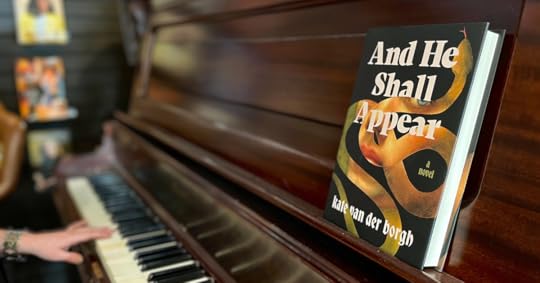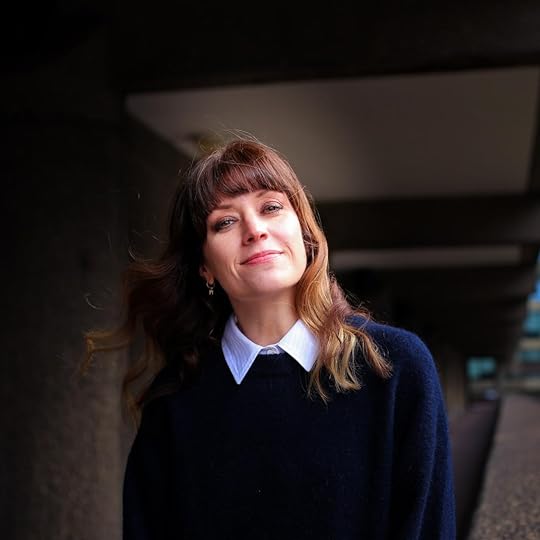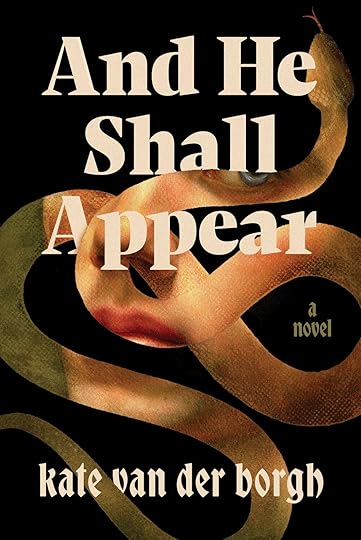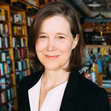A Sort-of-Ghost Story: An Interview with Kate van der Borgh

When I started the first page of And He Shall Appear, I had to jump up and search my house for a pen, because the words needed to be underlined. The writing drew me in like a spell, and five hours later, I’d reached the end, staring at my wall, overcome with dark, obsessive love and music. I still cannot get over it. Thank you to the author, Kate van der Borgh, for being willing to answer my questions about her incredible debut novel!
— Rachel Randolph, Parnassus bookseller
 Kate van der Borgh
Kate van der BorghRachel Randolph: And He Shall Appear is told in a dual timeline, alternating between our narrator’s past and present. This structure is integral to the reader’s experience of the novel, but I am curious what your, the writer’s, experience of it was? Did you write chronologically or jump around in time?
Kate van der Borgh: Oh, I jumped around all over the place! I didn’t even write chronologically within the past and the present timelines themselves. Which is maybe why I ended up redrafting so many times…
In the beginning, all I knew was that this was probably a story in two halves. First, the narrator would strive to build a friendship with Bryn. Then, that friendship would fall disastrously apart. That very structure demanded certain plot points – for instance, I knew the past timeline would have to feature some kind of confrontation at that midpoint, where the friendship seems to turn. And I knew that, in the present day timeline, the narrator would end up facing this old friendship one last time. For a while at least, I tended to write those ‘essential’ scenes and afterwards fill in the gaps in between.
Saying that, one of the very first scenes I wrote was the one at the auditions, when the narrator is handed a page featuring Bryn’s photograph – just because I knew this would be a soul-shaking moment. Sometimes you start writing a scene because you think it will be dramatic or emotionally powerful, and only later do you find out whether it has a place in the story or not! I had to kill more than a few darlings by working that way.
Rachel Randolph: The narrator of the story is an unnamed outsider, longing to be a part of something, finally. What was it like to balance distance and detail within his perspective?
Kate van der Borgh: That’s a really interesting question. The thing is, the narrator has an eye for detail, even for the things that to him feel painfully out of reach. So, he notices things from his own world, like Tim’s cheap, supermarket shirt. But he also notices the smallest things about Bryn’s behavior, his expressions, his possessions, right down to the smell of the different rooms in Bryn’s home. And it’s some of these details that show just how distant he is from this person he essentially worships.
It’s a kind of hypervigilance, I think. The narrator is terrified of tripping up – of using the wrong phrase, wearing the wrong thing – and confirming what he believes is everyone else’s view that he doesn’t belong. So he’s constantly looking to learn the right ways of doing things, or spot the sleight of hand that everyone else is able to carry off. He lives in this world of minutiae, so that’s where I had to live in the writing.
When it comes to the distance, though, the narrator tends to avoid thinking about painful things at all. So, without giving too much away, over the course of the story he’s confronted with some ideas about Bryn that he finds uncomfortable. And his inclination is to ignore them completely. He never actively misleads us about who Bryn is, but he avoids being completely honest with himself and therefore with us. It becomes hard to tell the difference between the things the narrator doesn’t actually know about Bryn and the things he simply doesn’t want to acknowledge.
Rachel Randolph: In contrast with the narrator is Bryn Cavendish, an epic and almost mythical figure who brings forth the utmost longing from the narrator. What was it like to create such differing characters? What do you think draws them to each other and what does their relationship say about class?
Kate van der Borgh: It was a lot of fun to create someone like Bryn! In some ways, he needs to be the opposite of the narrator, because his unattainable qualities are partly what draw the narrator in. At the same time, there needs to be enough overlap in the Venn diagram of their characters for them to click. But part of the fun of writing Bryn is that he only ever appears through the narrator’s eyes. You see him in jigsaw pieces that don’t fit easily together. And, while the narrator expresses at least some of his neuroses quite frankly, we never truly get to see Bryn’s inner life. So, he’s as inscrutable as he is charming.
Thinking about what draws them to one another, I think it’s fairly straightforward from the narrator’s point of view. Bryn is, as we’ve said, everything the narrator is not. And, more than that, Bryn represents an escape from the narrator’s imperfect past, a door to another, rarefied world. For me, the narrator’s ultimate fear is that he’s destined to live a particular life in a particular place, tied very tightly to a particular personal history – and his only way out is to become close to Bryn, or to become a person like Bryn.
As for what Bryn sees in the narrator, it could be many things. It’s possible that, as a very privileged person, he sees the working class as faintly exotic and is intrigued by the narrator and his ways. There has long been a trend of well-off people glamorizing working class culture – so, streetwear becomes almost gentrified – and it could be that Bryn is aiming to soak up what he sees as street cred. But, again, this is all through the narrator’s eyes. Just to muddy the waters here, Bryn calls on the narrator twice in the story, for the weekend away and for the visit to Trinity, and he does so with very specific reasons. It’s no coincidence that the narrator ends up playing the piano more than once for his friend…
Which leads us onto the big class question. It’s too simplistic to say that the narrator is attracted to Bryn simply because he’s posh. Not everyone aspires to that label! For me, it’s more that the narrator is in a strange in-between position – his friends from home make fun of his new ‘Cambridge’ accent, while his Cambridge peers make fun of his broad Northern tones. I don’t think people talk enough about the very destabilizing side effect of social mobility, which can leave people feeling uprooted – the writer Lynsey Hanley has written brilliantly about this in her book Respectable: Crossing the Class Divide.
So, the narrator is adrift. And in Bryn he sees someone in total control of their identity and their surroundings. Which is absolutely a class thing, because Bryn’s privilege is the source of this control. His whole life, Bryn has been surrounded by family and friends who all speak a certain way, who know certain people and ways of being. He’s been born to the Cambridge life that the narrator finds so perplexing. It’s not that Bryn is cheating anybody or doing anything wrong – but he’s built for this world, and the world is built for him, which means he’s much more likely to navigate it successfully than our narrator.
Rachel Randolph: The story delves into the supernatural and magical, but walks the line of reality as well, causing the reader to question everything happening on and off the page. How did you balance revealing and withholding truths from the reader?
Kate van der Borgh: Ha, with difficulty! I wanted there to be lots of ambiguity – so it was important that, throughout, elements of the story could be explained both as ‘real’ and also as supernatural. Which wasn’t always easy to pull off. It’s like having two stories running in parallel, where the same actions have different meanings. (Ultimately, though, there are clues that might encourage you to lean more towards one interpretation than the other.)
Funnily enough, one thing that helped with the writing was learning a bit about how magic works. I read a brilliant book by Gustav Kuhn called Experiencing the Impossible: The Science of Magic, which is full of fascinating ideas about how our brains work to experience magic. For example, if you see a magician taking something out of their pocket, you’ll find it almost impossible to conceive that the magician could be sneaking something into that pocket at the same time. Your brain sees the action is either taking or putting, but never both, and magicians exploit this little blind spot all the time.
The book made me think about different kind of misdirection – how, if you want to hide something with your left hand, you might draw the viewer’s attention with your right. Also, how you might trick audiences with a false ‘solution’ to a puzzle before pulling the rug. Thinking how this might work in writing, say you’ve got a character whose identity you want to keep secret for a while. Instead of leaving the identity a wide open mystery – which only sets readers’ minds racing and encourages them to search for answers – subtly drop hints that will quietly put the wrong identity in readers’ minds. That way, readers relax and stop looking for answers at all, so are perfectly primed to be surprised. Ta da.
Rachel Randolph: The novel cast a spell on me, one of obsession, fascination, betrayal, pain, and finally, acceptance. The characters, plot, and writing all work together to mesmerize the reader. What effect do you hope this book will have on its readers?
Kate van der Borgh: Ah I’m so grateful to you for those words. I mean, I couldn’t have hoped for much more of an effect than that. It sounds simple, but one of my hopes is that readers will be a little bit spooked. This is a sort-of-ghost story, and in my view ghost stories should always give you a shiver. I absolutely love being scared by stories (I still remember what is essentially a jump scare in Shirley Jackson’s The Haunting of Hill House, when I nearly threw the book across the room) so if a reader finds themselves slightly chilled, that’ll be nice. I also hope that the reader will feel a little bit wrong-footed in places, because who doesn’t love to be fooled?
At the same time, the adjective I often use to describe this book is sad. Ultimately, it’s the story of a man who is absolutely trapped in the past – a man returning and returning to a moment in time, as if he might replay it and change the outcome. And, while he’s busy reminiscing, time is rumbling on. By fixating on the past, he’s wasting his life away. This for me is the real horror: to be so trapped by the past that you end up without a future.
Rachel Randolph: The fantastic comparable titles initially drew me to And He Shall Appear, such as Bunny by Mona Awad, If We Were Villains by M.L. Rio, and Babel by R.F. Kuang. What books do you associate with this project? Were there books that you read and though “that’s the effect I want to create?”
Kate van der Borgh: I absolutely love all the titles you mention there, and it’s hugely flattering even to be mentioned in the same sentence. Readers often – very understandably – see this book in the context of other dark academia titles. But my biggest book inspiration was something very different. In my very wildest dreams, I wanted to create an effect similar to that in Julian Barnes’ The Sense of an Ending, a story about a sixty-something man named Tony, who receives a strange inheritance from an ex-girlfriend’s mother and ends up revisiting and rethinking the relationships of his youth. The revelations of the story completely upend what Tony has always believed about himself and his life – and I was blown away by these ideas about the precariousness of memory, the power of self-deception. It’s such a slim book, but it’s packed with the biggest and most profound ideas about human experience. I adore it.
It also does something else I love: it creates soul-shaking drama without huge peaks of action. So, people’s lives are turned upside down not by a massive, dramatic event, like a car crash or a fight scene, but by a conversation. A character delivers a line of dialogue, and the whole world starts falling in. I feel like The Remains of the Day does a similar thing. Again, I won’t go in to too much detail, but there’s at least one moment where I’m striving to create that kind of effect. (This answer reveals that I am, quite hilariously, trying to emulate novels that have both Booker and Nobel prizes between them, but I guess we’ve all got to aim high, right?!)
Rachel Randolph: And lastly, here’s a fun bookstore question: What is your fondest memory of an
independent bookstore?
Kate van der Borgh: I have desperately fond memories of a bookstore that no longer exists. It was called All You Read is Love, and it was in Leytonstone, East London, where I live now. They had a gorgeous selection of secondhand books, as well as brilliant taste in background music, and they served cocktails named after fictional characters. It was actually one of the places where I worked on the first draft of And He Shall Appear – I used to go after work, get my laptop out, and order a Winston Smith (basically a negroni). These days, I’m a huge fan of another local bookstore called Phlox, whose owner gives the best book recommendations. If you’re ever in town, I’ll show you around!
And He Shall Appear is on our shelves now! Grab your copy today.
 newest »
newest »
 Thank you for bringing the book to our attention. It sounds like a wonderful read!
Thank you for bringing the book to our attention. It sounds like a wonderful read!
Ann Patchett's Blog
- Ann Patchett's profile
- 27422 followers




